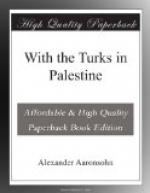My inspection of the devastation caused by the locusts completed, I returned home. The news that greeted me there was alarming. I must narrate with some detail the events which finally decided me to leave the country. About one hour’s ride on horseback from our village lives a family of Turkish nobles, the head of which was Sadik Pasha, brother of the famous Kiamil Pasha, several times Grand Vizier of the Empire. Sadik, who had been exiled from Constantinople, came to Palestine and bought great tracts of land near my people. After his death his sons—good-for-nothing, wild fellows—were forced to sell most of the estate—all except one Fewzi Bey, who retained his part of the land and lived on it. Here he collected a band of friends as worthless as himself and gradually commenced a career of plundering and “frightfulness” much like that of the robber barons of mediaeval Germany. Before the outbreak of the war he confined his attentions chiefly to the Arabs, whom he treated shamefully. He raided cattle and crops and carried off girls and women in broad daylight. On one occasion he stopped a wedding procession and carried off the young bride. Then he seized the bridegroom, against whom he bore a grudge, and subjected the poor Bedouin to the bastinado until he consented to divorce his wife by pronouncing the words, “I divorce thee,” three times in the presence of witnesses, according to Mohammedan custom. This Bedouin was the grandson of the Sheikh Hilou, a holy man of the region upon whose grave the Arabs are accustomed to make their prayers. But we villagers of Zicron-Jacob had never submitted to Fewzi Bey in any way; our young men were organized and armed, and after a few encounters he let us alone.
After the mobilization, however, and the taking away of our arms, this outlaw saw that his chance had come. He began to send his men and his camels into our fields to harvest our crops and carry them off. This pillage continued until the locusts came—Fewzi, in the mean while, becoming so bold that he would gallop through the streets of our village with his horsemen, shooting right and left into the air and insulting old men and women. He boasted—apparently with reason—that the authorities at Haifa were powerless to touch him.
[ILLUSTRATION: HAIFA AND THE BAY OF AKKA. LOOKING EAST FROM MOUNT CARMEL]
There was one hope left. Djemal Pasha had boasted that he had introduced law and order; the country was under military rule; it remained to see what he would say and do when the crimes of Fewzi Bey were brought to his notice. Accordingly, armed with my boyouroulton, or passport, of a locust-inspector, I rode to Jerusalem, where I procured, through my brother, who was then in favor, an interview with Djemal Pasha. He received me on the very day of my arrival, and listened attentively while for a whole hour I poured out the story of Fewzi Bey’s outrages. I put my whole heart into the plea and wound up by




